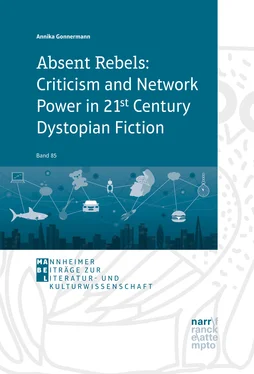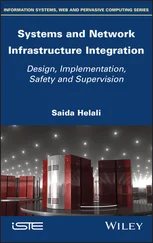Annika Gonnermann - Absent Rebels - Criticism and Network Power in 21st Century Dystopian Fiction
Здесь есть возможность читать онлайн «Annika Gonnermann - Absent Rebels - Criticism and Network Power in 21st Century Dystopian Fiction» — ознакомительный отрывок электронной книги совершенно бесплатно, а после прочтения отрывка купить полную версию. В некоторых случаях можно слушать аудио, скачать через торрент в формате fb2 и присутствует краткое содержание. Жанр: unrecognised, на английском языке. Описание произведения, (предисловие) а так же отзывы посетителей доступны на портале библиотеки ЛибКат.
- Название:Absent Rebels: Criticism and Network Power in 21st Century Dystopian Fiction
- Автор:
- Жанр:
- Год:неизвестен
- ISBN:нет данных
- Рейтинг книги:3 / 5. Голосов: 1
-
Избранное:Добавить в избранное
- Отзывы:
-
Ваша оценка:
- 60
- 1
- 2
- 3
- 4
- 5
Absent Rebels: Criticism and Network Power in 21st Century Dystopian Fiction: краткое содержание, описание и аннотация
Предлагаем к чтению аннотацию, описание, краткое содержание или предисловие (зависит от того, что написал сам автор книги «Absent Rebels: Criticism and Network Power in 21st Century Dystopian Fiction»). Если вы не нашли необходимую информацию о книге — напишите в комментариях, мы постараемся отыскать её.
Absent Rebels: Criticism and Network Power in 21st Century Dystopian Fiction — читать онлайн ознакомительный отрывок
Ниже представлен текст книги, разбитый по страницам. Система сохранения места последней прочитанной страницы, позволяет с удобством читать онлайн бесплатно книгу «Absent Rebels: Criticism and Network Power in 21st Century Dystopian Fiction», без необходимости каждый раз заново искать на чём Вы остановились. Поставьте закладку, и сможете в любой момент перейти на страницу, на которой закончили чтение.
Интервал:
Закладка:
[N]etwork power exists in all the ways people are drawn to each other, wanting to gain access to cooperative activities with other people. It is relational: we cannot even talk about this power outside the multiple networks of individuals whose choices are shaped by allegiance to a common standard. It is immanent: not an abstract force, but inherent in our mediating social institutions. (ibid. 140)
To summarise, the analytics of network power show how aggregated individual choices can come to constitute a form of decentralised power immanent in social relations – and all without the command of a central authority (cf. ibid. 139). While “many theorists would prefer to attribute all relevant causation to identifiable individuals and their actions alone” (ibid. 127), Grewal opts for the middle line between individual responsibility and systemic coercion, thus paving the way for literature to escape the notion of methodological individualism. Grewal argues that “[i]t is possible to articulate a systemic condition of power without attributing ultimate agency to anything other than interdependent human choices and actions” (ibid. 129, emphasis in the original). In the context of neoliberalism this theory explains why “the blame for [the] failure [to abolish capitalism] does not lie with the subjects of contemporary capitalist societies, even though the responsibility for social change can lie nowhere else (that is, with ‘us’)” (Best 499). In fact, the people suffering from certain standards might actually be the origin and stabiliser of the system in the first place; we must acknowledge that “the structure, in this case, is a product of ‘our’ collective agency” (ibid.).5 Describing a vicious circle of support and suffering, Grewal’s approach visualises the neoliberal mechanisms of power: while neoliberalism claims to be free of coercion and oppression (in the West)6, its proponents constantly conflate the notions of freedom and voluntariness. He and Olsaretti argue convincingly that freedom alone does not suffice; it is voluntariness for which we should strive. His theory thus becomes the theoretical framework through which contemporary dystopian fiction can critically assess neoliberalism, showcasing its inherent misconception of ‘freedom.’
III. ‘Crowd-Founded’ Dystopia: Dave Eggers’ The Circle (2013)
Born in 1970, Dave Eggers has only recently entered the stage of dystopian fiction with his 2013 novel The Circle – as The Guardian journalist Edward Docx argues, a “work so germane to our times that it may well come to be considered as the most on-the-money satirical commentary on the early internet age.” Eggers had formerly made a name for himself as one of the “leading figures in [a] ‘group of emerging young writers’” (Hoffmann 23), as a result of his renowned first novel, the autobiographical A Heartbreaking Work of Staggering Genius (2000), which received critical attention primarily due to its rich meta-fictional commentary (cf. Mackay) and its reflections on authorial authenticity, confession, and memoirs (cf. Nicol). Ever since then, the Boston-born author has regularly featured on international and US-American bestseller lists. Commenting on a variety of events defining the 21 stcentury, such as Hurricane Katrina, US-Middle-Eastern relations, or police shootings, Eggers has secured himself a stable readership and a loyal fanbase at home and abroad.1
Yet his relationship to reviewers is complex. While his work is usually discussed favourably, Eggers is also criticised for his literary instinct, which translates into an almost opportunistic hunt for the zeitgeist . This leads journalist Hillary Kelly to comment somewhat sarcastically, “[i]f you’ve read it [sic!] about it in The New York Times Sunday Review , chances are Dave Eggers has considered it as source material” (Kelly; cf. also Galant). Kelly’s comments are paradigmatic, exemplifying the ambivalent relationship of critics to Eggers’ work that seems to culminate in the discussions over his first dystopian novel. The Circle has proven to be very controversial; the critique usually highlights two points in particular, with the first concerning the novel’s literary quality. Some reviewers criticise the novel’s intellectual and literary deficiencies (cf. Hugendick et al.), accusing the text of banality of language and plot, flat characters, and an in-your-face didactic message that reduces the novel to an exercise in black-and-white painting (cf. McMillan). Eggers, says The New York Times columnist Ellen Ullman, “tends to overexplain,” resulting in the almost cartoonlike depiction of the characters inhabiting Eggers’ fictional company campus.
The controversy over the quality of Eggers’ work has grown into a debate about what should be considered more important, the quality of fiction or its didactic effect. Indeed, this is a very old discussion in the context of dystopian fiction, which has always had to fend off attacks from the literary establishment (cf. the concept of the ‘Menippean Satire’ by Northrop Frye; Frye, Criticism 309). However, all questions of literary quality aside, Eggers’ indisputable success and the sheer scale of the readership buying his books speak volumes. His novels are popular enough to shape the national and international discourse on dystopia, technology, and capitalism significantly. In December 2019, the German newspaper Spiegel Online declared The Circle even to be one of the ten novels that shaped and influenced the bygone decade (cf. F. Bayer). Eggers’ texts must therefore be treated seriously even if their literary quality may not compare to the works of the Grand Dame of dystopian fiction, Margaret Atwood, or those of the Nobel laureate, Kazuo Ishiguro.
The second point of criticism focuses on the plausibility of the novel. Particularly those working within the tech industry have accused Eggers of naivety and ignorance: Laura Bennett, for instance, discredits Eggers since – according to her – he has not understood how an operating system works. Furthermore, Graeme McMillan and Felix Salmon criticise Eggers’ technical illiteracy, claiming that his lack of facts makes “it all too easy to dismiss his whole book as the work of someone who hasn’t got the faintest clue what he’s talking about.” The question arises, however, whether an author must necessarily be aware of the technical details in order to aptly interrogate and provide adequate commentary on the thematic complexity of technology and society. In fact, the entire discussion is reminiscent of the accusations directed at Kazuo Ishiguro for not providing enough background information on the donation system in his dystopia Never Let Me Go ;2 just as the critique against Ishiguro, the criticism focused on Eggers is unsubstantial, missing the point in question entirely.
Despite minor inaccuracies regarding the depiction of technology, The Circle can be read as an up-to-date representation of a thriving company in Silicon Valley, holding up “the mirror of art in order to show us ourselves and the perils that surrounds us” (Atwood, “Privacy”). Ron Charles, for instance, reminds the readers of his Washington Post review that “we’re already living” in that world. As Gwyneth Jones writes, “at this particular moment in time, reality and science fiction are moving into such close conjunction that science fiction is no longer the strange reflection and artistic elaboration of current preoccupations: the mirror and the actuality have almost become one” (vii). The Circle is definitively one of the more recent dystopias that bring the perils of the future closer to home, refraining from projecting the despicable dystopian world decades into the future, instead providing an accurate reflection of the now. The novel latches on to the extraliterary reality of its readers, grounding its tale in plausibility, common knowledge, and popular discourses of the early 21 stcentury. Set in contemporary California, Eggers’ novel focuses on the rise of the eponymous tech giant ‘the Circle,’ which emerges as the sole survivor of a cutthroat capitalist competition, having subsumed “Facebook, Twitter, Google, and finally Alacrity, Zoopa, Jefe, and Quan” ( TC 23).3 The novel adopts the perspective of the 24-year-old protagonist, Mae Holland – like Winston Smith an Everyman character standing in for the average reader (cf. Gellai 299) –, and accompanies her from her first day in her new job. Recently ‘escaped’ from a mediocre position with neither career opportunities nor health insurance for family members, Mae is overwhelmed by the seemingly eutopian opportunities at the Circle. But “as the story advances, our view of the Circle moves from bright to dark to darker” (Atwood, “Privacy”), prompting us to reconceptualise the initial impression.
Читать дальшеИнтервал:
Закладка:
Похожие книги на «Absent Rebels: Criticism and Network Power in 21st Century Dystopian Fiction»
Представляем Вашему вниманию похожие книги на «Absent Rebels: Criticism and Network Power in 21st Century Dystopian Fiction» списком для выбора. Мы отобрали схожую по названию и смыслу литературу в надежде предоставить читателям больше вариантов отыскать новые, интересные, ещё непрочитанные произведения.
Обсуждение, отзывы о книге «Absent Rebels: Criticism and Network Power in 21st Century Dystopian Fiction» и просто собственные мнения читателей. Оставьте ваши комментарии, напишите, что Вы думаете о произведении, его смысле или главных героях. Укажите что конкретно понравилось, а что нет, и почему Вы так считаете.












